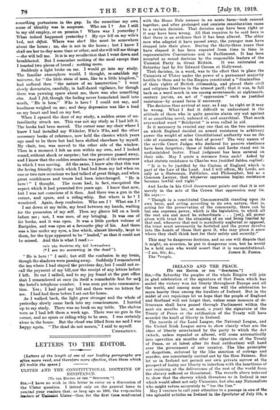LETTERS TO THE EDITOR.
[Letters of the length of one of our leading paragraphs are often more read, and therefore more effective, than those which fill treble the spaced ULSTER AND THE CONSTITUTIONAL DOCTRINE OF RESISTANCE.
fTo THE EDITOR OP THE " SPECTATOR."]
Sta.,—I have no wish in this letter to enter on a discussion of the Ulster question. I intend only on the general issue to remind your readers that, as long ago as 1886, the responsible leaders of Unionist Ulster—then for the first time oonfronted
with the Home Rule menace in an acute form—took counsel together, and after prolonged and anxious consideration came to a certain decision. That decision may have been right or it may have been wrong. All that requires to be said here is that there is no evidence that it has been altered. The older men who adopted it have passed away, the younger men have stepped into their place. During the thirty-three years that have elapsed it has been repeated from time to time in representative Conventions and in Parliament. It has been accepted as sound doctrine by the responsible leaders of the Unionist Party in Great Britain. It was reiterated on Saturday last by Sir Edward Carson at Hollywood.
That decision, in a word, was to the effect that to place the Unionists of Ulster under the power of a permanent majority hostile to them and to the Empire constituted a " diminution of their rights of British citizenship, and placed their civil and religious liberties in. the utmost peril; that it was, to fall back on a word much in use among seventeenth- or eighteenth- century jurists, an act of "oppression" such as justified resistance—by armed force if necessary.
The decision thus arrived at may, as I say, be right or it may be wrong. What I find It difficult to understand is the attitude of those who in quite genuine alarm cry out against it as something novel, unheard of, and anarchical. That much overworked word "Bolshevist " is even called in aid.
Is it necessary to remind any one that on the two occasions on which England decided on. armed resistance to arbitrary power the weight of sober Constitutional authority was on the side of resistance, not on that of power? The very names of the servile Court Judges who declared for passive obedience have been forgotten; those of Selden and Locke stand out in undiminished lustre. Final judgment has been entered on their side. May I quote a sentence from each? Asked by what statute resistance to Charles was justified Selden replied :
" It is to be justified by the Custom of England which is part of the Law of the Land. And I will affirm, My Lords, not only as a Statesman, Politician, and Philosopher, but as a Common Lawyer, that whenever oppression begins resistance becomes lawful and right."
And Locke in his Civil Government points out that it is not merely in the acts of the Crown that oppression may lie. He says:—
"Though in a constituted Commonwealth standing upon its own basis, and acting according to its own nature, that is, acting for the preservation of the community, there can be but one supreme power, which is the legislative, to which all the rest are and must be subordinate . . . [yet), all power given with trust for the attaining of an end being limited by that end, whenever that end is manifestly neglected or opposed, the trust must necessarily be forfeited and the power devolve into the hands of those that gave it, who may place it anew where they shall think best for their safety and security."
This may be dangerous doctrine, and no one will dispute that it might, on occasion, be put to dangerous uses, but he would be a bold man who would assert that it is unconstitutional.


































 Previous page
Previous page